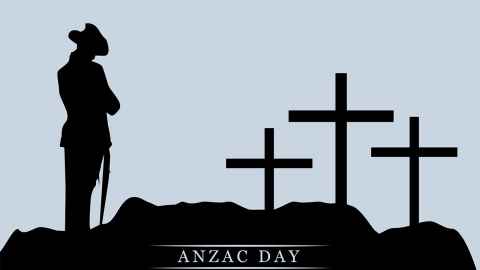Winners and losers in war all salute their fallen
24 April 2021
Opinion: Nations mark victory and defeat in war in different ways. Preventing future conflict is at the heart of the drive to commemorate, writes Stephen Hoadley.

Anzac Day is unique to New Zealand and Australia. It commemorates the formation and deployment of the Australian and New Zealand Army Corps to Gallipoli during World War I. It has evolved into a sober reflection on comradery and sacrifice, support for veterans and their families, and appeals for an end to wars.
Some say that ANZAC Day is odd inasmuch as it arose from a military defeat, not a victory. But out of disaster has come humility and respect by the living for the bravery of the fallen. Even the former enemy, Turkey, has embraced the event and opened the battlefield to New Zealanders and Australians, formerly bitter enemies now respected friends.
While Australians and New Zealanders celebrate the Anzac Day of 2021 they might take a moment to appreciate the sacrifices of soldiers of other countries, and their surviving families, friends, neighbours and societies. They may reflect on the fact that almost every country in the world has some equivalent of our Anzac Day, albeit by other names and with differing emphases. Below, I offer some examples. My aim is not to diminish our unique Anzac Day but rather to place it in a wider context, one which will emphasise our essential humanity across national borders.
Commonwealth countries generally commemorate November 11, the date of the end of World War I, as Remembrance Day. Formerly called Armistice Day, it is the equivalent of Anzac Day in Great Britain and Canada. That date is observed also by France and Belgium, where much of the fighting took place. Nearby Netherlands celebrates the Remembrance of the Dead, but on 4 May and with a focus wider than World War I.
The US celebrates its many wars twice a year, once on Memorial Day at the end of May and again in November on Veterans Day. Russia, whose casualties in the war against Nazi Germany were the world’s greatest, also celebrates twice, once in February on Defence of the Fatherland Day and again on Victory Day in May.
Other governments have focal points specific to their histories and military achievements. Some project overtly political themes. Italy in its Liberation Day each April celebrates the fall of the fascist and Nazi regimes in 1944. Turkey celebrates Armed Forces Victory Day to remember the final expulsion of Greek forces from Turkish soil and islands. The Republic of Korea in June commemorates uprisings against the Japanese imperial army in 1920, and has added acknowledgement of sacrifices in the Korean War (1950-1953) and the Vietnam War. Japanese prime ministers annually bow to fallen soldiers at the Yasukuni Shrine, an act which the Chinese view as an obeisance to war criminals who massacred 200,000 civilians at Nanking, and the US views as distorted glorification of the planners of Japan’s sneak attack on Pearl Harbour in 1941.
As in the case of the Anzac experience, these were all defeats, or stalemates or temporary victories at best. But that does not detract from the heroism and stoicism of the soldiers or the suffering endured by the general populations of nations at war. Perhaps it is this element of widespread, undeserved tragedy that gives these days their enduring appeal.
The Vietnamese, in their turn, celebrate National War Veterans’ Day every March. They, at least, can claim to celebrate victory, having forced out the militaries of France, the US and its partners South Korea, Thailand, Australia, and New Zealand, those of the US-backed Republic of Vietnam in the south, and finally those of the incursion by China in 1979. We struggle to imagine the half-century of deaths, injuries, and destruction the Vietnamese people endured on the way to their final victory, and our empathy with them as fellow humans moderates the fact that we were on opposing sides.
Examples could be multiplied, but the message is the same. Soldiers are victims as well as victors in war, and their societies are too. Whether called Memorial Day, Armistice Day, Remembrance Day, or Liberation Day, they share with Anzac Day the respect that the living owe to the dead who fought resolutely on their behalf, irrespective of history’s judgement of the right or wrong of the conflicts in which they fought.
In hindsight, we are inclined to forgive those on the front lines and rather blame their leaders for misdirected policies. It is in that spirit that we can approach Anzac Day, as a celebration of human fortitude and sacrifice, and as a collective plea to curb future war.
Dr Stephen Hoadley is Associate Professor of Politics and International Relations at the University of Auckland’s Faculty of Arts.
This article reflects the opinion of the author and not necessarily the views of the University of Auckland.
Used with permission from Newsroom Winners and losers in war all salute their fallen 24 April 2021.
Media queries
Alison Sims | Research Communications Editor
DDI 09 923 4953
Mob 021 249 0089
Email alison.sims@auckland.ac.nz